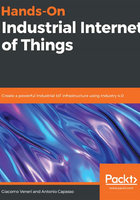
IoT background
Over the last few years, the IoT has become a viral topic in the digital world, one that is discussed, debated, and analyzed in many channels, forums, and contexts. This is common for all new or emerging software technologies. Developers, architects, and salespeople discuss the capabilities, impacts, and market penetration of the new technology in forums, blogs, and specialized social media. Think, for example, of Docker or Kubernetes, which are changing the ways in which software applications are designed, implemented, and deployed. They are having a tremendous impact on the digital world in terms of time to market, software life cycle, capabilities, and cost. Despite this, they remain primarily confined to their specialized fields. This is not the case for the IoT.
Over the last 10 years, the IoT has become a familiar topic in the mass media. This is because the IoT is more than just a new technology that impacts a restricted range of people or a specific market. It can be better understood as a set of technologies that impacts us all, and will change markets, even creating new ones. The IoT is changing our lives, feelings, and perceptions of the physical world daily, by modifying how we interact with it. The development of the IoT is a crucial moment in the history of humanity because it is changing our mindset, culture, and the way we live. Just like the internet age, we will have a pre-IoT phase and a post-IoT phase. The IoT era will be not an instantaneous transition, but a gradual and continuous shift during which the evolution never stops.
Currently, we are just at the beginning of this journey. Like the arrival of e-commerce or mobile applications, there is a certain time lag between when you hear about an upcoming technology and when it actually exists in the real world. But the change has started. We are moving toward a world in which we interact increasingly not with physical objects, but with their digital images that live in the cloud and communicate with other digital images. These images are integrated through a powerful injection of digital intelligence, which makes them capable of suggesting actions, making decisions autonomously, or providing new and innovative services. You might currently be able to regulate your heating system remotely, but if it lived in the cloud and received information from your car, your calendar, your geolocation, and the weather, then your heating system would be able to regulate itself. When an object lives in the cloud and interacts with other digital images in a web of artificial intelligence, that object becomes a smart object.
These developments might seem to be paving the way for a new and perfect world, but there is a dark side to the IoT as well. A lot of personal data and information is stored in the cloud, in order that artificial intelligence can extrapolate information about us and profile our behaviors and preferences. From a different perspective, therefore, the cloud could also be seen as a sort of Big Brother, as in George Orwell's novel 1984. There is the possibility that our data and profiles could be used not just to enhance our lifestyles, but also for more malicious purposes, such as political or economic influence on a large scale.
An example of this was the Cambridge Analytica scandal that occurred in March 2018. It was widely reported at the time that this company had acquired and used the personal data of Facebook users from an external researcher who had told Facebook he was collecting it for academic purposes. This researcher was the founder of the third-party app thisisyourdigitallife, which was given permission by its 270,000 users to access their data back in 2015. By providing this permission, however, these users also unknowingly gave the app permission to access to the information of their friends, which resulted in the data of about 87 million users being collected, the majority of whom had not explicitly given Cambridge Analytica permission to access their data. Shortly afterward, the media aired undercover investigative videos revealing that Cambridge Analytica was involved in Donald Trump's digital presidential campaign.
This book will not go into detail about the social, legal, political, or economic impacts of the IoT, but we wanted to highlight that it does have a dark side. More often than not, human history has demonstrated that a technology is not good or bad in itself, but instead becomes good or bad depending on how it is used by humans. This is true for the IoT. Its power is tremendous, and it only just starting to be understood. Nobody yet knows how the IoT will develop from now on, but we are all responsible for trying to control its path.